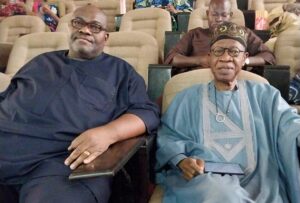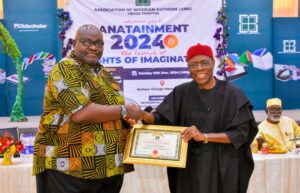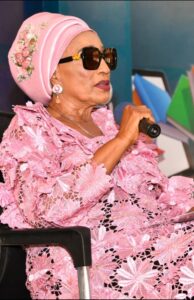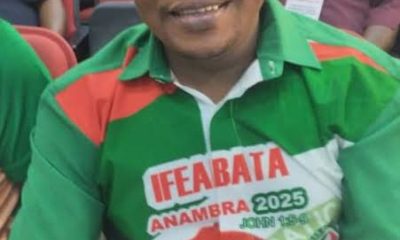Entertainment
A WEEKEND TREAT WITH KEMA CHIKWE AND TAFAWA BALEWA(PHOTOS)
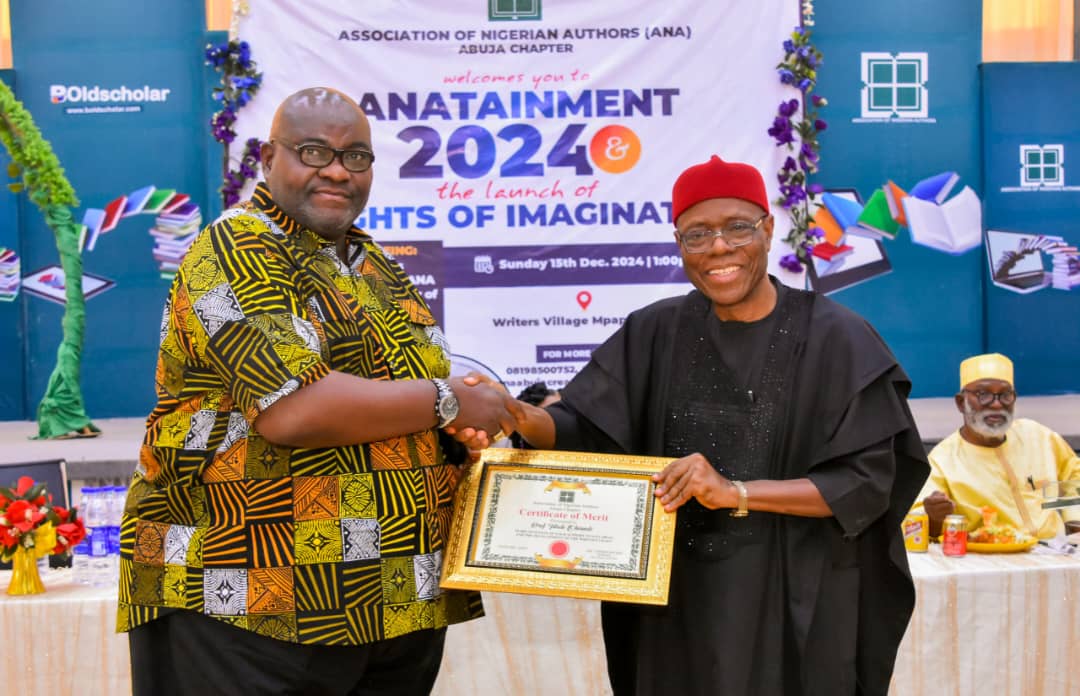
By Tunde Olusunle
Abuja, Nigeria’s capital city, makes no pretences about a robust arts and culture tradition, as vivacious as in good old Lagos. The National Theatre in Iganmu; the Musical Society of Nigeria’s (MUSON) Centre in Onikan; the *Goethe Institut,* *Terra Kulture,* and *Silverbird Cinemas,* all in Victoria Island, are some of the more popular cultural venues across *Eko akete,* (one of Lagos’s primordial cognomens). There used to be *Motherlan’* in Ikeja where the masked Afrobeats artist *Lagbaja* used to have regular live performances. Not forgetting the *New Afrika Shrine,* developed by Femi and Yeni Kuti, offsprings of the Afrobeats precursor, Fela Anikulapo-Kuti, to replace the primordial model built by their father, in Agidingbi, Ikeja. The older facility elsewhere in the same Ikeja district, was serially buffeted by previous military regimes. It was indeed once reduced to rubble by agents of a *khaki-wearing* regime, because of Fela’s characteristically brave, caustic and relentless denunciations of martial governance. *The Truth Village* in Surulere, also in “mainland” Lagos is yet another culture bubble spot which ensures that culturally savvy in Lagos are spoilt for choice.
Abuja does not, as yet have an organic, overarching structure to its cultural life. True, bars and lounges which in some instances host deejays and smart in-house bands; restaurants, nightclubs are not in short supply. Literary events, theatre productions, musical performances especially by rated artists, stand-up comedy shows, however, only feature from time to time on specific occasions and designated venues. The exquisite *Transcorp Hilton Hotel* at the very heart of Abuja; the *Cyprian Ekwensi Cultural Centre* in Garki and the *Shehu Musa Yar’Adua Centre* in Abuja’s central area, are favourite hosting venues. The *International Conference Centre,* (ICC), also in Abuja’s central business district; the *Mamman Vatsa Writers Village* ensconced between the rocks of Mpape district, and the auditorium of the *National Universities Commission,* (NUC) are also helping with the cultivation of a sustainable artistic sensitivity amongst Abuja residents. There is also the *French Cultural Centre* in the upscale Wuse district, which is also playing a role in the awakening of cultural consciousness in the federal capital.
In over two decades of my sojourn in Abuja, I have been privileged to enjoy performances and productions in many of the venues listed above. I witnessed an outing by the Haitian-American singer and rapper, *Wyclef Jean,* sponsored by Guinness Nigeria Plc, back in August 2004, at Abuja’s International Conference Centre. Nigeria’s *Tuface Idibia* shared the stage with him on that occasion, a performance which spontaneously produced the song “Proud to Be African.” The more polished, studio version of the song subsequently featured *Faze* and *Sound Sultan,* (of blessed memory), making it the product of a quartet and a very important platform for foreign exposure for the young Nigerian artists at the time. The perfected version of the song was released same year, 2004.
Back in 2007/2008, *Chams Plc,* an information and communication technology, (ICT) company, got involved in the production of selected Nigerian epics, as a way of reviving the waning culture of live theatre. Led by Demola Aladekomo, Chams Plc obtained the rights to adapt five Yoruba novels written by the iconic Daniel Fagunwa, into stage plays for performance in select Nigerian cities. I was opportune to savour the production of *Ireke Onibudo,* translated into English and adapted for stage by Femi Osofisan, Emeritus Professor andcglobally acclaimed playwright and scholar. It was titled *The Fabulous Adventures of the Sugarcane Man* and performed at Abuja’s Transcorp Hilton, in 2009. Onukaba Adinoyi-Ojo, departed friend and colleague, religiously produced his plays as soon as they were written. *The Killing Swamp,* an imaginary recap of the final hours of the renowned writer and *Ogoni* rights activist, Ken Saro-Wiwa before he was hanged by the regime of Sani Abacha, commanded capacity audience when it premiered at the Yar’Adua Centre.
The Abuja district of the Association of Nigerian Authors, (ANA), flagged off its activities for year 2025 by hosting its monthly “Reading and Writers’ Dialogue,” Saturday January 18, 2025. The theme of the event was “The Writer As Catalyst For Progressive Change.” Abuja ANA Chairman, the tireless Chukwudi Eze, a Fellow of the Nigerian Institute of Architects, (FNIA), rallied his team to dig out from retirement, Nigeria’s former Minister and Ambassador at various times, Kema Chikwe, to headline the programme. Dr Chikwe was famously known on the nation’s political scene where she was very active since the gestational period of the Fourth Republic, including her stint as National Women’s Leader of the Peoples Democratic Party, (PDP), in its years at the core of national politics. A part of her which not too many people remember is her intellectual and artistic sides.
For the avoidance of doubt, Chikwe studied French at the City University of New York, obtained a doctorate in curriculum education at the University of Nigeria Nsukka, (UNN), and taught for several years at the *Alvan Ikoku College of Education,* (AICE), in Owerri, Imo State. She authored children’s literature books like *Dibia’s Secret,* *First School Day for Adaeze,* *Kame Chameleon Tours the Garden,* (1991) and *My Precious Book.* She attempted to encapsulate the experiences of women in Nigerian politics in her 2003 book *Women of My Era* and returned to her first love, writing for young people with her book *Village Boys,* also published in 2003. Dr Chikwe attempted an overview of her stints as Minister, Diplomat, Chairman of the Joint Admissions and Matriculation Board, (JAMB) and PDP National Women’s Leader in yet another book she titled *Across Borders.*
Dr Chikwe spoke with a noticeably cracked voice, occasioned, perhaps by the present harmattan dryness and dust. She described the theme of the dialogue as “timely and profound, especially considering the pivotal role writers have always played in shaping societies and nations across the world.” Writers, she noted, have historically been the torch bearers of change, daring to challenge the status quo, advocate for justice and inspire action. According to her: “Writers have stood at the forefront of revolutions, be it through literature, poetry, prose, drama, pushing boundaries and igniting thought and reflection among readers.” Journeys towards progress and development across the world, she observed, have always been fraught with challenges. “We have faced political upheavals, economic struggles, social inequalities and environmental crises,” she noted.
Amidst all of these, writers according to her, “have remained resilient in their commitment to chronicling our stories, sharing our truths, and, most importantly, lighting the way forward.” One of the questions posed to her was about her son Naetochukwu Chikwe, whose stage name is *Naeto C,* and who is a popular Nigerian rap and Afrobeats musician. She confirmed her pride and happiness with how well he had evolved educationally, in his musical passion, and indeed as a family man. Vicky Sylvester, Professor of English at the University of Abuja chaired the panel of discussants. This included Andrew Bula of Baze University, Abuja, and the present writer. Attendees included Dr Joan Oji, ANA National Secretary; Dr Zakama Zabura, poet and author of *The Man Lived,* (1999); Jideofor Adibe, Professor of Political Science at the Nasarawa State University and author of *The Loneliness of Exile,* and Bella Anne Ndubusi, erstwhile Cultural Affairs Specialist at the US Department of State.
Sunday January 20, 2025 featured a stage play titled *Tafawa Balewa: Golden Voice of Africa,* written by Ola Awakan and directed by poet and former President of ANA, Denja Abdullahi. Originally scheduled for Yar’Adua Centre, the performance eventually held at the NUC auditorium in Maitama, Abuja. Ola Awakan conceived of a series of stage productions on iconic Nigerians under the broad theme *Tales of Legends.* The first outing of Awakan’s outfit under this canvas was the production last July of *Abibatu Mogaji,* a play in honour and memory of the mother of President Bola Tinubu. It was written by Ahmed Yerima, a seasoned Theatre Arts Professor and staged at the banquet hall of Aso Villa in July 2024. The President, his deputy, Kashim Shettima and their families attended the performance.
*Tafawa Balewa: Golden Voice of Africa* is a recollection of the evolution of Nigeria’s very first Prime Minister, Abubakar Tafawa Balewa. Much as it is a tribute to Nigeria’s only Prime Minister, the play highlights the fact of the intentional preparation of Nigeria’s earlier crop of leaders, their deliberate self-development, in preparation for service to their people and their homeland at various levels. The Jeremiah Obafemi Awolowos, Samuel Ladoke Akintolas, the Ayo Rosijis, the Nnamdi Azikiwes, the Michael Oparas, the Ozumba Mbadiwes, the Aminu Kanos, Sa’adu Zungurs, Isa Walis, attended some of the best educational institutions at the time, at home and abroad. They applied themselves to the grindstone of multifaceted grooming educationally and ideologically, empowering themselves for the liberation of their country from colonialism and for the leadership of their fatherland.
Balewa attended the famous *Barewa College,* Kaduna, easily an “Ivy League” institution in the north of Nigeria in his days. He equally schooled at the Institute of Education at the University of London thereafter, before returning home to give back to his country as a schoolteacher. He was elected into the Northern House of Assembly and thereafter into the Legislative Council in 1947. In his engagements, his passion for Northern Nigeria was unambiguous. He was Minister for Works in 1952, and later Minister for Transport. Tafawa Balewa was Nigeria’s Prime Minister at independence in 1960, a position he held until the coup d’etat of January 15, 1966, in which he was assassinated. This snowballed into mass protests and violent riots across northern Nigeria. The play was capably interpreted by the cast. It was a colourful celebration of Nigeria’s diverse cultures, interspersed with specific dance interludes, showcasing engaging gyrations in representative costumes from Fulani, Yoruba, Igbo, Bini, Tiv, Nupe cultural repertoires. The dexterity of the musical department was remarkable. They seamlessly traversed the multicultural diversity of the country with corresponding beats, nuances and rhythms.
The production was watched by an urbane audience which included former Information Minister, Lai Mohammed; literary figure and activist, Senator Shehu Sani; and the wives of former Chief Justice of Nigeria, (CJN), Lawal Uwais, and former Kaduna State Governor, Nasir El Rufai, Maryam Uwais and Hadiza El Rufai, respectively. Hafsat Abdulwaheed, poet and human rights figure; Albert Omotayo, Emeritus diplomat, and Shaibu Hussein, Director-General, National Films and Videos Censors Board, (NFVCB), were in the house. The Tafawa Balewa family was led to the performance by Saddik Tafawa-Balewa, a renowned filmmaker and son of the former Prime Minister. His brother, Mukhtar, author of the novel titled *Prince of Mali,* (2020) and I served as presidential aides in the Olusegun Obasanjo/Atiku Abubakar government. It was a fulfilling, albeit breathtaking Abuja weekend, during which one was wholly suffused in arts and culture, end-to-end. Football aficionados will rather describe the experience as a “box-to-box” cultural weekend treat!
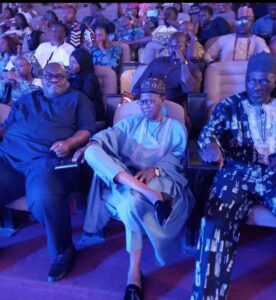
*Tunde Olusunle, PhD, Fellow of the Association of Nigerian Authors, (FANA), teaches Creative Writing at the University of Abuja*
Entertainment
SAD ! Popular Nollywood actress, Monalisa Stephen is dead

Monalisa Stephen, a popular Nollywood actress and media personality is dead.
She died after a brief illness.
The Chief Executive Officer of Best of Nollywood (BON) Seun Oloketuyi, via his Instagram on Wednesday announced the sad news, disclosing that the controversial actress died yesterday, May 13th after battling low blood sugar and internal bleeding.
He added that the deceased actress’ sister confirmed her passing. Sharing the photo, he wrote: “Brand influencer Monalisa Ayobami Stephen is dead,she died yesterday in Lagos after losing the fight against Low sugar and internal bleeding, Her immediate younger sister confirmed the death of this hardworking and beautiful soul.”
More details shortly…
Entertainment
Funke Akindele listed among leading women in international film

Nigerian actress and filmmaker, Funke Akindele, has been named one of The Hollywood Reporter’s “Most Influential Women in International Film,” a prestigious global list celebrating 46 visionary women making a significant impact on the international film industry.
Reacting to the recognition, Akindele took to her Instagram page on Friday to express her excitement and gratitude for the honour.
She described the moment as not just a personal celebration but a motivation to continue creating and uplifting others in the film industry.
“I’m deeply honoured and truly grateful to be featured in The Hollywood Reporter’s ‘The Most Influential Women in International Film. To be recognised among 46 powerful, visionary women from around the world is more than a moment of celebration—it’s a call to keep building, creating boldly, and lifting others as we rise,” she wrote.
The announcement, which was made on Friday, May 9 marks a significant milestone for Akindele, who has carved a niche for herself in Nollywood with her record-breaking films such as Omo Ghetto: The Saga and A Tribe Called Judah, as well as her contributions to television through the hit series Jenifa’s Diary.
Her consistent success has cemented her as one of the most bankable and influential figures in the Nigerian entertainment scene.
Akindele also used the opportunity to celebrate fellow Nigerian media mogul and honoree, Mo Abudu, describing her as a source of inspiration and a major contributor to the growth of the creative industry in Nigeria and Africa.
“A heartfelt congratulations to Aunty MO @moabudu who has also been featured in this great piece. Thank you so much, Ma, for your invaluable contribution to the creative industry. It’s an honor to be featured alongside someone who has been such a powerful source of inspiration,” Akindele added.
Entertainment
Mercy Aigbe wins ‘Best Supporting Actress’ at 2025 AMVCA for Farmer’s Bride

Nollywood actress, Mercy Aigbe, has taken home the ‘Best Supporting Actress’ award at the 11th Africa Magic Viewers’ Choice Awards (AMVCA), earning acclaim for her powerful role in Farmer’s Bride.
The win is a career milestone for Aigbe, who triumphed over a star-studded lineup that included Meg Otanwa (Inside Life), Tina Mba (Suspicion), Ireti Doyle (All’s Fair in Love), Ini Dima-Okojie (Skeleton Coast), Omoni Oboli (Wives on Strike 3), and Darasimi Nadi (Aburo).
Akelicious reports that the event kicked off on Friday with the Cultural Day event, marking the official beginning of the series of activities preceding the Award Night which is held on Saturday (today).
Attendees similarly graced the event with their exquisite traditional attire, presenting a captivating blend of African heritage and the glamour of the film awards.
The AMVCA is an annual award presented by Multichoice to recognise outstanding achievements in television, film, entertainment, and digital content creation throughout Nollywood and the entire African continent.
The award ceremony is held in Lagos, Nigeria, and broadcast live on all Africa Magic channels and the awards will be determined by a combination of public voting and a panel of judges.
The nominations, covering film, television, and digital content, recognise works released between January 1 and December 31, 2024.
Among the top contenders, Lisabi: The Uprising, Skeleton Coast, House of Ga’a, and Freedom Way secured multiple nominations across various categories, including Best Movie and Best Director.
In the acting categories, Gideon Okeke (Tokunbo), Stan Nze (Suspicion), Femi Adebayo (Seven Doors), and Adedimeji Lateef (Lisabi: The Uprising) were nominated for Best Lead Actor, while Chioma Chukwuka (Seven Doors), Bimbo Ademoye (Anikulapo: Rise of the Spectre), and Uche Montana (Thinline) are among those vying for Best Lead Actress.
-

 News14 hours ago
News14 hours agoTinubu Endorses Establishment of Forest Guards to Counter Terrorism, Banditry
-

 Opinion8 hours ago
Opinion8 hours agoHuman Capital Devt: The Rep Paul Nnamchi
-

 News14 hours ago
News14 hours agoNNPCL failed to remit N500bn revenue in 2024 – World Bank
-

 News14 hours ago
News14 hours agoFG launches smart police station in Abuja
-

 News4 hours ago
News4 hours agoBREAKING: PDP, NNPP Rep members abandon parties, lace boots with APC
-

 News8 hours ago
News8 hours agoNnamdi Kanu’s family wants court to ban NAN coverage of son’s trial or allow live streaming
-

 News8 hours ago
News8 hours agoSEE Current Black Market Dollar (USD) To Naira (NGN) Exchange Rate
-

 News2 hours ago
News2 hours agoAlleged cyber bullying: IGP re-arraigns VDM

